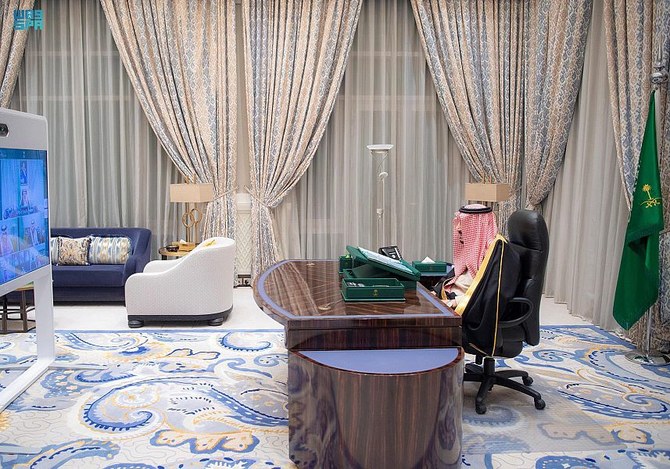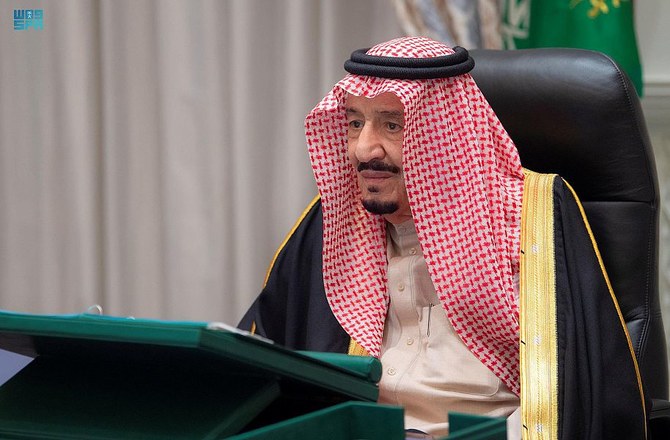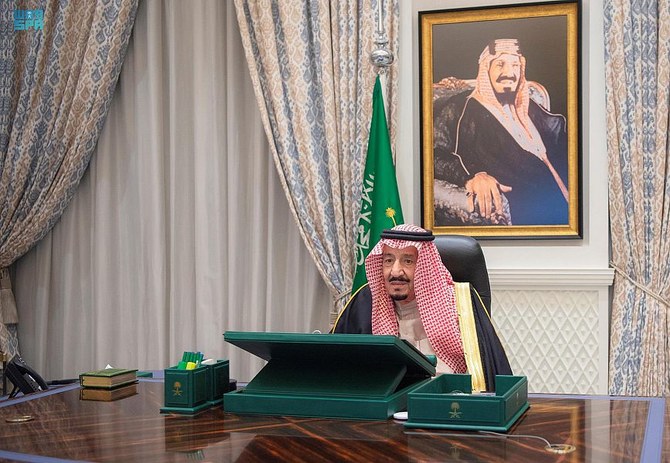RIYADH: Saudi authorities on Tuesday repeated their call for the international community to address the humanitarian needs of the Afghan people and provide sustainable aid.
During a weekly cabinet meeting, chaired remotely by King Salman from NEOM, the Council of Ministers reviewed the Kingdom’s speech delivered during an extraordinary meeting of the Organization of Islamic Cooperation, hosted by Pakistan on Dec. 19, to discuss the humanitarian situation in Afghanistan.
The cabinet also reviewed the Kingdom’s own humanitarian work and support for the needy around the world, including its air and land bridge operation to transport urgently needed relief, including humanitarian and food aid, to Afghanistan.
At the beginning of the session, the cabinet reviewed the programs and projects that are part of the state’s general budget for the next fiscal year, which aim to enhance human development, maintain the process of economic growth and diversification, and promote financial sustainability.
Ministers discussed the results of Crown Prince Mohammed bin Salman’s recent tour of neighboring Gulf Cooperation Council states and his talks with their leaders. They reviewed the positive outcomes of agreements reached during the royal tour, and during the 42nd session of the GCC Supreme Council in Riyadh on Dec. 14, with the aim of supporting cooperation, interdependence, integration and coordination in all fields.
Minister of Information Majid Al-Qasabi said that the cabinet also reviewed the outcomes of follow-up and political consultation committee meetings between the Kingdom and Egypt, during which both countries agreed to unify their visions on many regional and international issues and crises. They also agreed to continue their efforts to support regional security and stability, stressed the importance of joint Arab action, and rejected any attempts by regional forces to interfere in the affairs of Arab countries.
The council discussed other regional and international developments, and reiterated the Kingdom’s permanent position of support for the Yemeni government, its keenness to achieve security, stability and development for the Yemeni people, and its desire to further the efforts to reach a political solution to the seven-year war in the country.
The ministers praised the Arab coalition for its work in Yemen “confronting and thwarting the attempts of the Iranian-backed Houthi militia to target civilians and civilian objects, and to neutralize its hostile capabilities in accordance with international law and its customary rules.”
Meanwhile, the council described the selection of Diriyah as the Capital of Arab Culture for 2030 by the Arab Educational, Cultural and Scientific Organization as “a culmination of its historical position and cultural richness, which have made it one of the most prominent sites” in terms of cultural impact.
The cabinet also acknowledged the Kingdom’s election this month to a seat on the council of the International Maritime Organization, the UN agency responsible for measures to improve the safety and security of international shipping, and to prevent pollution from ships.
They said it reflects “the unlimited support that the maritime transport sector enjoys from the state, and in appreciation of the Kingdom’s international position, its great role in the maritime transport industry, and its contribution to initiatives related to security, safety and the marine environment.”
Ministers authorized the energy minister to a sign draft memorandum of understanding with Uganda in the field of renewable energy, and the minister of environment, water and agriculture to re-sign an amendment to an MoU for agricultural cooperation with Iraq.
They approved the Kingdom’s accession to the Hague Convention Abolishing the Requirement of Legalization for Foreign Public Documents, also known as the Apostille Treaty, and authorized the foreign minister to complete the resultant legal procedures that are required.
The cabinet also approved an MoU between the Saudi and Kuwaiti governments for cooperation in the fields of higher education and scientific research.
Saudi Arabia reiterates call for international aid effort to help Afghanistan
https://arab.news/4ynyz
Saudi Arabia reiterates call for international aid effort to help Afghanistan

- During a weekly cabinet meeting, chaired by King Salman, ministers also discussed Crown Prince Mohammed bin Salman’s recent tour of GCC nations
- They also reviewed the latest developments in Yemen and reaffirmed their support for the Yemeni government and people
Saudi Arabia welcomes ceasefire between Iran and Israel

- Kingdom thanks US President Donald Trump for helping to make the deal
DUBAI: Saudi Arabia’s Ministry of Foreign Affairs welcomed the US-brokered ceasefire deal between Israel and Iran on Tuesday morning.
In a statement on X, the ministry affirmed its position of wanting a de-escalation after 11 days of war and thanked US President Donald Trump for his efforts in making the deal.
“The Kingdom looks forward to the coming period witnessing a commitment from all parties to calm down and refrain from using force or threatening to use it,” read the statement.
Saudi Arabia hopes “this agreement will contribute to restoring security and stability to the region and sparing it the risks of continued escalation.”
The ministry said the Kingdom wants to reiterate its “firm position in supporting the adoption of dialogue and diplomatic means as a means to resolve regional disputes and conflicts.”
This should be “based on the principle of respecting the sovereignty of states and consolidating security, stability, prosperity and progress in the region and the world.”
#Statement | The Foreign Ministry expresses Saudi Arabia’s welcoming of the announcement made by President Donald Trump, President of the United States of America, regarding the agreement reached to establish a ceasefire between both parties involved in the regional escalation.… pic.twitter.com/nWSTERFKIQ
— Foreign Ministry (@KSAmofaEN) June 24, 2025
Saudi crown prince calls Qatari emir as Kingdom condemns ‘unjustifiable’ Iran attack on Qatar

- Kingdom affirmed solidarity and full support for Qatar, is deploying all capabilities to support country in all measures it takes
- Widespread Arab condemnation following attacks
RIYADH: Saudi Arabia on Monday condemned strikes launched by Iran on targets in Qatar, a foreign ministry statement said.
“The Kingdom of Saudi Arabia condemns and denounces in the strongest terms the aggression launched by Iran against the sisterly State of Qatar, which constitutes a flagrant violation of international law and the principles of good neighborliness,” the statement said.
“It is unacceptable and cannot be justified under any circumstances,” it added.
Saudi Arabia’s Crown Prince Mohammed bin Salman made a phone call to Sheikh Tamim bin Hamad Al Thani, Emir of Qatar.
During the call, the Crown Prince affirmed the Kingdom’s full support for Qatar and its condemnation of the unjustified blatant aggression launched by Iran against the gulf state, the Saudi Press Agency said.
The Crown Prince also affirmed that the Kingdom has deployed all its capabilities to support Qatar as it takes measures to protect its security and preserve its sovereignty.
The Kingdom affirmed its solidarity and full support for Qatar and is deploying all its capabilities to support the country in all measures it takes, the statement added.
Iran launched missile attacks Monday on a US military base in Qatar, retaliating for the American bombing of its nuclear sites in the early hours of Sunday morning.
Qatar condemned the attack on Al-Udeid Air Base attack, but said it successfully intercepted the missiles and no casualties were reported. It said its airspace is now safe.
UAE condemnation
The UAE described the attack as a flagrant violation of Qatar’s sovereignty and airspace, and a clear contravention of international law and the UN Charter.
In a statement, the UAE Ministry of Foreign Affairs affirmed its categorical rejection of any attack that threatens Qatar’s security and safety and undermines the security and stability of the region.
The ministry expressed the UAE’s full solidarity with Qatar and its unwavering support for all measures aimed at protecting the security and safety of its citizens and residents.
It also stressed the need for an immediate halt to military escalation, warning that the continuation of such actions would undermine regional security and drag the region down dangerous paths with disastrous repercussions for international peace and security.
The statement further called for diplomatic solutions and the principle of good neighborliness, stressing that serious dialogue remains the only way to overcome current crises and safeguard the region’s security, stability, and the safety of its people.
Egypt concerned
Egypt also expressed its strong condemnation and denunciation of the Iranian attacks, considering them a “violation of its sovereignty, a threat to its territorial integrity, and a violation of international law and the United Nations Charter.”
Egypt also expressed its “deep concern over the rapidly escalating and dangerous situation in the region,” stressing its "complete rejection of all forms of military escalation or infringement on the sovereignty of states,” according to a statement from the Egyptian Foreign Ministry.
Bahrain urges international action
Bahrain affirmed its “full support for the sisterly State of Qatar following the Iranian attack on its territory."
Bahrain expressed its solidarity as “required by the bond of brotherhood and blood, and affirms the solidarity of the Gulf Cooperation Council countries in these sensitive circumstances facing the region, to exert the necessary efforts to exercise self-restraint, avoid escalation, and resolve all disputes through peaceful means,” according to the Bahrain News Agency.
The kingdom called on the international community and the UN Security Council to shoulder their responsibilities in condemning the attacks, and taking effective steps to deter Iran's irresponsible actions. It also urged cooperation to restore stability and prevent further escalation in the region, embracing dialogue and diplomacy to preserve the security of the region and the peace of its people.
Omani rejection
Oman condemned the ongoing escalation in the region. An official spokesperson for the Omani Ministry of Foreign Affairs described the Iranian missile attack on Qatar as “a rejected and condemned act” that violated the sovereignty of a Gulf Cooperation Council state, contradicted the principles of good neighborliness, and risked expanding the conflict to devastating effect.
Kuwait
Kuwait also denounced the Iranian strike, calling it a “blatant violation” of Qatari sovereignty and airspace and “a dangerous escalation that threatens peace, security, and stability in the region.”
Iraq’s deep concern
The Iraqi Ministry of Foreign Affairs expressed deep concern over the “dangerous and accelerating escalation,” describing the attack on Qatar as a turning point that could expand the conflict and warned of the risks posed by the involvement of new actors in the confrontation.
Jordan
Jordan strongly condemned the missile strike, calling it a “flagrant violation” of Qatar’s sovereignty and international law. The Ministry of Foreign Affairs and Expatriates affirmed Jordan’s “absolute solidarity” with Qatar in confronting threats to its security and stability.
Wider Arab response
Morocco joined the chorus of condemnation, with its Ministry of Foreign Affairs describing the attack as a “blatant missile strike” and reiterating the Kingdom’s full solidarity with Qatar.
Gulf Cooperation Council Secretary-General Jassim Mohammed Al-Budaiwi said the organization was “surprised” but strongly condemned the Iranian attack, calling it a direct threat not just to Qatar but to all GCC states. He reaffirmed the Council’s unity and expressed surprise that the strike came despite the GCC’s condemnation of Israeli actions and ongoing mediation efforts.
The Arab Parliament echoed these concerns, labelling the attack “a flagrant and unacceptable violation of Qatari sovereignty” and warning of the dangers of further escalation.
Lebanese President Joseph Aoun condemned the strike as a violation of a sister nation’s sovereignty, cautioning that it would heighten tensions and hamper de-escalation efforts.
Palestine also issued a statement of support for Qatar, describing the attack as a “blatant violation” of its sovereignty and affirming solidarity with the Qatari people.
-----
French solidarity
French President Emmanuel Macron on Monday called for a return to negotiations after Iran’s attack.
“The spiral of chaos must end,” he wrote on X. “I call on all parties to exercise the utmost restraint, de-escalate and return to the negotiating table.” He expressed his solidarity with Qatar.
Speaking to broadcaster France 2, Foreign Minister Jean-Noel Barrot said: “This is a dangerous escalation in which Iran bears a heavy responsibility. It is a cycle of violence that puts the region at risk of a widespread conflagration, which would have very serious repercussions even here at home.”
UN chief ‘deeply alarmed’
The UN Secretary-General is deeply alarmed by the further escalation of the conflict in the Middle East, a spokesperson for Antonio Guterres said Monday.
“From the outset of the crisis, the Secretary-General has repeatedly condemned any military escalation in this conflict, including (Monday)’s attack by Iran on the territory of Qatar. He further reiterates his call on all parties to stop fighting,” the spokesperson said.
“The Secretary-General urges all member states to uphold their obligations under the UN Charter and other rules of international law,” they added.
New Arabic program aids healthcare workers

- The initiative is part of a broader effort to offer profession-specific Arabic courses
RIYADH: The King Salman Global Academy for Arabic Language, in collaboration with the Riyadh Second Health Cluster, has launched the third edition of its Arabic for Health Purposes program, an educational initiative for non-Arabic-speaking healthcare professionals.
The program equips doctors and nurses with practical Arabic communication skills through an intensive two-month curriculum.
The initiative is part of a broader effort to offer profession-specific Arabic courses, the Saudi Press Agency reported on Monday.
It blends classical Arabic with the Saudi dialect and includes cultural activities to support integration into the local community.
Delivered through a flexible model accommodating various learning styles, it aims to enhance healthcare workers’ performance in real-world settings.
The first edition in 2024 involved four Riyadh-based healthcare facilities and benefited more than 150 practitioners.
The second edition, completed in April, served 52 participants in partnership with the Riyadh First Health Cluster.
GCC secretary general attends Gulf parliament speakers' meeting

- Al-Budaiwi emphasized the importance of establishing a stable mechanism to regulate the relationship between the Gulf parliaments and the European Parliament
RIYADH: Secretary-General of the Gulf Cooperation Council Jasem Al-Budaiwi participated in a meeting of the speakers of the Shura, Representatives, National and Ummah Councils of the GCC states, alongside President of the European Parliament Roberta Metsola in Abu Dhabi on Monday.
Al-Budaiwi emphasized the importance of establishing a stable mechanism to regulate the relationship between the Gulf parliaments and the European Parliament, an official report said.
“The importance of this meeting lies in its timing, which comes at a time when Gulf-European relations are witnessing a growing trend on most levels and a convergence of views on many regional and international issues,” he said in an official statement.
Iranian consul general commends Saudi Arabia for smooth pilgrim departure

- Smooth procedures reflect the care for pilgrims by the Kingdom and its leadership
- Services provided to Iranian pilgrims confirm the Kingdom’s consistent respect for all nations
RIYADH: Consul General of Iran in Jeddah Hassan Zarnegar praised the organization and facilities provided to Iranian pilgrims during their departure via Arar airport and the Jadidat Arar border crossing in the Northern Borders region.
He said the smooth procedures reflect the care for pilgrims by the Kingdom and its leadership, and demonstrate attention to pilgrims from all countries, the Saudi Press Agency reported on Monday.
Zarnegar added: “The streamlined procedures — from disembarkation and swift passport processing to organized bus transfers — reflect efficient pilgrim management.”
He said that the services provided to Iranian pilgrims confirm the Kingdom’s consistent respect for all nations.
He added that Saudi-Iranian relations are rooted in religious and neighborly ties, and the care shown to Iranian pilgrims reflects this spirit of brotherhood.
On behalf of himself and the Iranian ambassador, Zarnegar expressed gratitude to the Saudi leadership for their care and support, provided as part of an integrated system.
Meanwhile, Director General of the Border Guards Maj. Gen. Shaya Al-Wadaani inspected the work of personnel at the Jadidat Arar border crossing and monitored services supporting pilgrims’ departure after Hajj.
Al-Wadaani reviewed the procedures facilitating Iranian pilgrims’ exit, following directives from King Salman and Crown Prince Mohammed bin Salman to ensure proper services and support.
He confirmed that the Border Guard has mobilized all resources, in coordination with relevant authorities, to deliver the best services and ensure a smooth departure process.
























